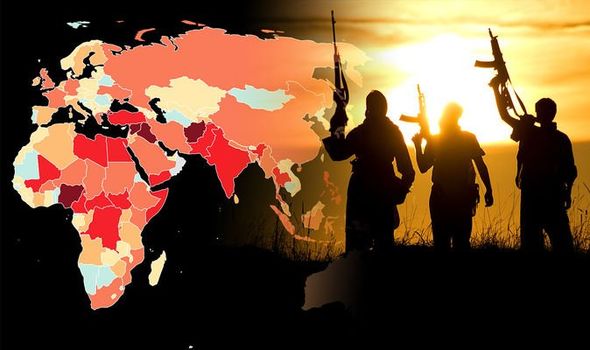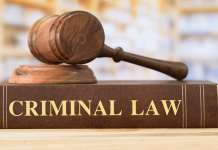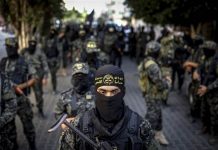This article is written by Aarzoo Guglani, a student at ILS Law College, Pune. This article focuses on the principal act of this repealed act and tries to provide reasons for its repeal. Also, it briefs about certain historical and current anti-terrorism laws in India. This article is edited by Ilashri Gaur, a law student pursuing B.A. LLB(Hons.) from Teerthanker Mahaveer University (CLLS).
Table of Contents
Introduction
India has been at constant war with terrorism since its independence. From the Mandai Massacre by tribal terrorists in 1980 to the recent Pulwama attack in 2019, there have been more than 12,000 terrorist attacks, major and minor, in India. Therefore, the government, no doubt, strives to make laws to prevent such incidents as much as possible. Every government which has come into force has tried and tested their own set of anti-terrorist laws. The Prevention of Terrorism Act (POTA) of 2002, was one such Act brought by the National Democratic Alliance (NDA) government, it is claimed to be a product of the 9/11 attack at the World Trade Center and the subsequent 2001 Indian Parliament attack in New Delhi. This article, therefore, tries to answer questions like, what was the act? And why was it repealed?
Historical overview
Terrorist and Disruptive Activities (Prevention) Act of 1985, amended in 1987, was the first Act against the terrorist activities happening in the country. It was forced between 1985-1995 under the pretext of the Punjab insurgency and was applied to the whole of India. This act necessarily gave a thorough definition of “terrorism”. But in 1995, it was repealed due to the growing unpopularity of the act, because of its widespread abuse. It was recorded that almost 75,000 people were detained all over India under TADA and of these 73,000 cases had to be subsequently withdrawn due to lack of evidence.
After TADA was repealed, the Union Cabinet in 2001 passed the Prevention of Terrorism Ordinance or POTO, this Act was claimed to be a response to “an upsurge of terrorist activities, intensification of cross border terrorism, and insurgent groups in different parts of the country”. This ordinance gave state law enforcement sweeping powers for investigation, detention, and prosecution for a wide range of terrorist-activities. Necessarily, POTO targeted people who presumably incited, supported, abetted, harbored, concealed, or benefited from the proceeds of terrorism. The said ordinance, during a joint session convened at the Prime Minister’s request, then became the Prevention of Terrorism Act (POTA) in March 2002.
For the discussion of why POTA was repealed, it’s important to first understand what was the act in the first place, and how it was used or misused in its period of enforcement.
The Prevention of Terrorism Act, 2002
POTA was the government’s “best remedy to deal with terrorist activities” according to Manmohan Singh’s government. It was NDA’s first major policy decision after coming into power in 2001. It was passed in the Lok Sabha after a 10-hour debate with 425 votes in favor and 296 against, though was rejected in the upper house (Rajya Sabha).
The salient features of the acts were:
- The Act provided the definition of “terrorist” and included investigation and punishment clauses. Though the act had laws that gave power to the executives for investigation and detention of any suspect, it also did include certain safeguards to ensure the discretionary power.
- Under this act, a suspect could be detained for up to 180 days without the filing of the charge sheet in the court. Also, one major aspect this act provides is preventive detention, that is the imprisonment of a person for preventing them from committing further offenses or for maintaining public order.
- In general law under the Code of Criminal procedure, 1973, Section 161, does not consider confessions made to the police as admissible evidence in the court of law, but under POTA, such confessions to the police can be used as evidence against the suspect.
- Any decision on the bail petition filed by the suspect, or appeal against any decision by the special court under POTA, can be appealed in the High Court of the specified jurisdiction.
- The act also provided for the setting up of review committees at the state and central level.
- The provisions under POTA also provided, that Confessions must be recorded within 48 hours before a magistrate, who will send the accused for a medical examination if there is a complaint of torture. Further, a legal representative of the accused can be present for part of the interrogation.
- Moreover, police officers can be prosecuted for misusing their authority. The POTA also provided that victims apart from imprisonment could also be paid compensation.
Why was the Act repealed?
After two years of the enforcement of POTA, multiple cases of its abuse were reported across the country, which majorly included targeting the minorities and the abuse of it against political opponents. The misuse of the act was claimed to be inseparable from its normal use because of the very nature of the provisions of the act. The safeguards mentioned above were not effective enough to shield the violating nature of the act. Therefore, in 2004 the act was repealed.
Following are some of the leading problems due to which the act was repealed:
- The definition: The definition of “terrorism” which was claimed to be a bit less precise when compared with the definitions from other countries like the USA in the USA Patriot Act, 2001. Moreover, the law imposed a minimum five-year sentence on, “whoever conspires or attempts to commit, or advocates, abets, advises or incites or knowingly facilitates the commission of, a terrorist act or any act preparatory to a terrorist act . . . .” The use of words “advocates” and “incites” in this definition, is problematic as they implicate of free speech and political opinion. Such loose use of words throughout the act has caused misinterpretation and misappropriation of POTA.
- Powers of Arrest and Detention: Section 49(2) of POTA allowed police to restrain a suspect for up to 180 days, which is far more than the general law of CrPC. Also, the CrPC provides the convict with basic rights and safeguards like prompting the convict about the grounds he/she has been arrested and representation in front of the magistrate within the earliest opportunity, POTA even failed to give basic rights essential to the fundamental rights of life and liberty, to “suspects” (not even “convicts”). Further, the bail procedures under POTA were very stringent, postponing the bail for years together was becoming a common phenomenon. The denial of bail under POTA interprets as if there was a presumption of guilt for the suspect, and such presumption caused biased trials.
- Appeals and Reviews: When in 2002 the said act was legislated it asked for setting up of reviewing committees at the state and central level, but these committees had mere suggestive or advisory capacity. Even after the 2003 ordinance which brought in improvements in the authority of these committees, where it gave authority to review the case of an “aggrieved person” at the instance with superficial facts, their resources remained limited in terms of autonomy to start an investigation and for other procedures. Also, the committees had very limited time-frames in which they had to give their reports.
- Mass Arrests: Only four months after the effect of the act, various states started capitalizing the broad definition of terrorist and proceeded to arrest a huge number of people, within very short and without substantial evidence and only as “suspect”. 250 people nationwide were arrested in the very first quarter of the enforcement, and the numbers kept on increasing. At the end of the second quarter, there were almost 940 people arrested, and out of which 560 faced imprisonment. The law’s application was also unpredictable, varying from state to state in multiple ways. States like Gujarat, Jharkhand, Uttar Pradesh, and Jammu Kashmir, used this act as a tool against minorities as in Gujrat alone, 123 Muslims were arrested under POTA.
- Political Abuse: The act, by different politicians in different states, were used for political rivalries, where the people from the rival party were getting arrested in states like Tamil Nadu, by the then Chief Minister J. Jayalalitha. Jammu and Kashmir also faced such kinds of political abuse of the act, when politicians were blamed and charged for importing large sums of money from different countries.
- Lack of adequate surveillance of the police and due to insufficient prosecutorial decision making, arbitrariness, discrimination, and disuniform application create broad immunities from prosecution against government officials.
Many more such disguised problems arose due to the existence of this Act. The act was no different than its precedent TADA which for similar reasons failed to prove a good enough anti-terrorism law, for being against the fundamental rights of life and liberty.
Current Anti-terrorism Act in India
On the 21st day of September 2004, The Prevention of Terrorism (Repeal) Act, was enacted to repeal the principal act i.e The prevention of Terrorism Act, 2002. And it was stated in the repealed act that nothing withstanding in the principle act shall affect the previous operations, arrests, legal proceedings, investigation etc. done under this act. That means the people who were arrested in the two-year span of this act, still continued to fight for their release, but because there was no anti-terrorism law in place after the repeal of the act, the trials were done based on general law.
The only Anti-terrorism Law which prevails in India is the Unlawful Activities (Prevention) Act, 1967 (UAPA). This law was enacted by Parliament in 1967 to enable the imposition of reasonable restrictions on the rights to freedom of speech and expression, peaceful assembly, and formation of associations or unions in the interest of sovereignty and integrity of India. The original Act was aimed at unlawful activities of a general nature, and stringent provisions on terrorism were added only later through various amendments starting in 2004, following POTA repeal which was eventually amended in 2008 in response to the Mumbai terrorist attacks. The amended UAPA incorporated the definition of a terrorist act under section 15 and created new terrorist offenses. It also increased the period of detention without bail and changed the presumption of innocence to that of guilt where certain conditions were met, thus bringing in the stringent provisions for which POTA was earlier criticized.
The recent amendment in UAPA was done in 2013, which largely concerned with the economic and financial aspects of terrorism. A person may be punished under UAPA, for the offenses mentioned in the act, even if the offenses are committed outside India.
In addition to the UAPA, there are State and Central laws intended to deal with specific public order and security situations in the localized area. One such is Armed Forces (Special Powers) Act, 1958 (AFSPA) which is a law enacted by Parliament to check insurgency in the North-East by giving additional powers to the armed forces in areas declared ‘disturbed areas’. These provisions were extended to Jammu & Kashmir in 1990 through the enactment of the Armed Forces (Jammu & Kashmir) Special Powers Act. State legislatures have also enacted laws intended to address organized crime and militancy. These laws include the MCOCA, applicable in Maharashtra and Delhi, the Karnataka Control of Organised Crime Act, 2000 (KCOCA’), and the Chhattisgarh Vishesh Jan Suraksha Adhiniyam, 2005 [Chhattisgarh Special Public Safety Act] (CVJSA’).
Conclusion
Anti-terrorism acts in India, time to has been facing backlashes due to its vague nature and that they often violate the Human rights of a convict or a suspect. There have been hundreds of arrests under such laws which still continue to be in jail without trials even after the repeal of the concerned act. Human Rights Council, in its consideration of India’s anti-terrorism laws, must give clear guidance to the Government Of India to abolish its discriminatory and draconian laws and their equally draconian implementation in the country if it wishes to be considered among civilized nations and countries. India claims to be the largest democracy in the world, and thus such laws that deny the enjoyment of human rights to any individual do go in with the existing nature of a democratic country.
LawSikho has created a telegram group for exchanging legal knowledge, referrals and various opportunities. You can click on this link and join:
 Serato DJ Crack 2025Serato DJ PRO Crack
Serato DJ Crack 2025Serato DJ PRO Crack











 Allow notifications
Allow notifications


